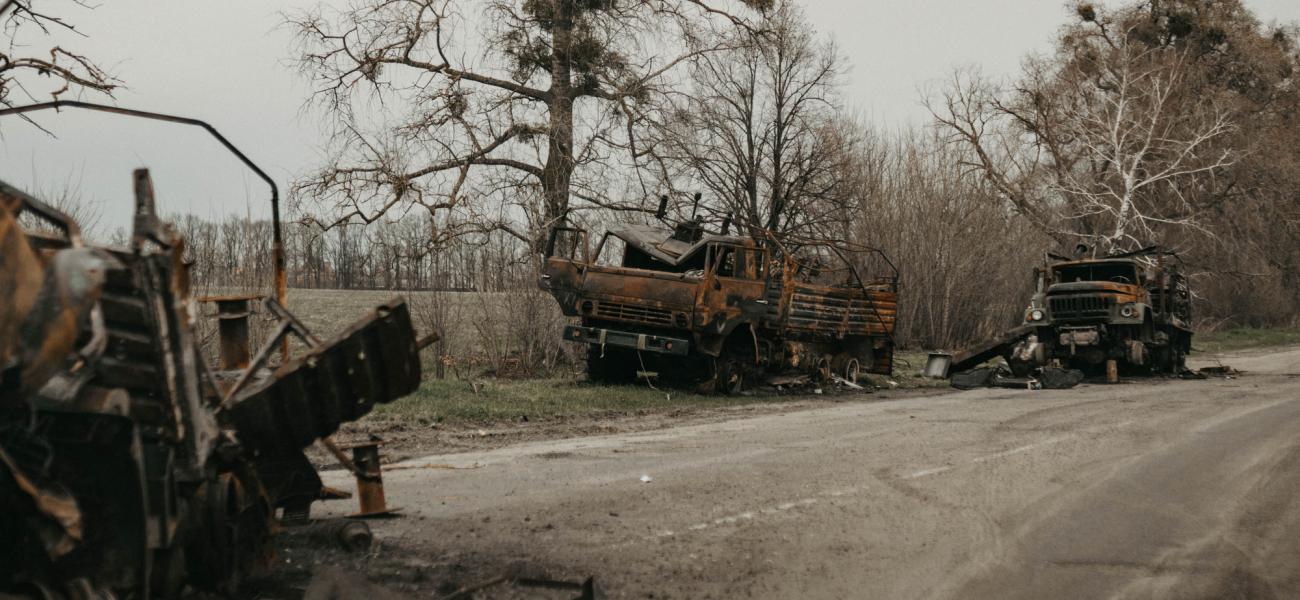
What Went Wrong With Russia’s Invasion of Ukraine?
When The Washington Post’s editorial board declared that "the war is not going Putin’s way” only three days after the Russian president ordered an invasion of Ukraine, it seemed the esteemed publication’s writers had jumped the gun. However, subsequent weeks suggested they were onto something, as Russian offensives stalled and reports emerged of Russian soldiers having to forage for food and fuel.
Eleven weeks after the Feb. 24 invasion it is clear that Vladimir Putin’s initial plan has failed. What is less clear is what exactly went wrong and why. We have scoured dozens of commentaries and interviews by experts—mostly military and mostly Western, but also Russian, Ukrainian and Asian—in search of answers. Of the flaws in planning and execution identified by experts, several categories stand out, in our view:
- Underestimating the Ukrainian leaders’, military’s and public’s will and ability to resist;
- Underestimating the collective West’s will and capability to aid Ukraine;
- Poor planning of the military campaign, calling for simultaneous achievement of multiple objectives along several axes, unachievable with resources committed to attaining these objectives;
- Failure to establish a single chain of command for the operation, to ensure that advancing units have adequate and timely protection and supplies and to achieve air superiority.
More detailed descriptions of these and other miscalculations in Russia’s campaign are below, from both experts and journalists. But the longish list does not mean that either Russian defeat or continued Western unity in support of Ukraine is a done deal.
|
Poor military planning / overestimating Russian forces |
|
|
Poor planning of the military campaign, calling for simultaneous achievement of multiple objectives along several axes with a quantitatively and qualitatively insufficient invading force/overestimating the capabilities of the Russian armed forces |
|
|
Underestimating Ukraine/West |
|
|
Underestimating the NATO-trained Ukrainian armed forces’ and volunteers’ capabilities and will to fight |
|
|
Underestimating the will and capability of Ukraine’s leadership and its public to oppose the Russian invasion and occupation |
|
|
Underestimating the collective West’s will and capacity to organize substantial military aid to Ukraine |
|
|
Other military failures |
|
|
Failure to inform personnel in a timely manner that they would be taking part in an invasion, to clearly outline their units’ missions and to psychologically prepare servicemen for combat
|
|
|
Failure to prevent plummeting of morale |
|
|
Failure to establish a single chain of command for the operation, which, until April, lacked a single commander |
|
|
Lower-level commanders lacking authority/initiative to modify original missions of their units even when facing peril |
|
|
Failure to organize effective force protection by infantry for advancing armor units |
|
|
Poor quality of equipment, partially explained by corruption |
|
|
Failure to ensure timely and secure provision of adequate supplies of fuel, ammunition and other items for advancing units |
|
|
Failure to provide timely and secure means of communications and navigation, plus failures in electronic warfare |
|
|
Failure to attain air superiority |
|
|
Failure to perform combined arms operations |
|
|
Russian commanders’ lack of experience in fighting large conventional wars |
|
As the Financial Times’ reporters summed up on March 25, “What was supposed to be a lightning Russian ground incursion has shuddered to a halt, crippled by broken supply lines, tactical mistakes, low morale and determined Ukrainian resistance. Russia’s army, the largest in Europe, lacks the manpower and the tactics to punch through Ukrainian defenses.” The failure to anticipate and prevent all these mistakes is all the more astounding given that even some of the hawkish voices in Russia, such as retired general Leonid Ivashov and retired colonel Mikhail Khodarenok, issued detailed, evidence-based warnings that a Russian invasion of Ukraine won’t be a walk in the park.
Putin’s failure to heed such warnings indirectly reaffirms the long-popular view that relying on his ever narrower circle of advisors, all of whom have siloviki outlooks, can lead to rash, poor decisions.
But none of this means that Russian forces cannot learn from their mistakes and attain success after narrowing the battle front to the southeast where they have reportedly achieved significant progress. As U.S. Army Lt. Col. (ret.) Alex Vershinin warned in his recent piece on lessons of the battle for Kyiv: “The Russian government’s initial miscalculations about the level of support from the Ukrainian population undermined their plan for a quick, bloodless victory. However, the Russian government has recognized its mistakes, and after accepting a political cost, has now changed course… By changing course early, the Russian government has demonstrated itself to be a dangerous and adaptable enemy. The real challenge for Western governments lays in … making rapid course adjustments once mistakes become apparent.”
Footnotes
- Roman Abramovich reportedly “had to disabuse Putin of his conviction that Zelenskyy would flee the country once the invasion began.” (Bloomberg, 04.20.22)
The opinions expressed herein are solely those of the authors and/or individuals cited. An earlier version of this compilation included an excerpt from this opinion piece, which has been deleted pending verification. Photo by DmytryiOzhhikhiin free for use.

